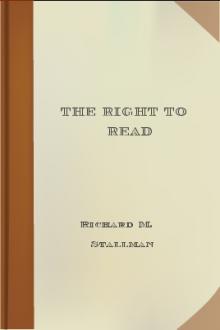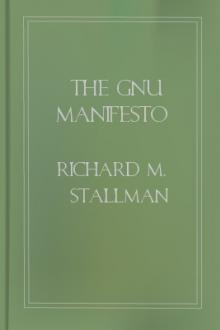author - "Richard M. Stallman"

asingly set up to give absentee operators control over the peopleactually using the computer system.
The SPA, which actually stands for Software Publisher's Association,is not today an official police force. Unofficially, it acts likeone. It invites people to inform on their coworkers and friends; likethe Clinton Administration, it advocates a policy of collectiveresponsibility whereby computer owners must actively enforce copyrightor be punished.
The SPA is currently threatening small Internet service providers,demanding they permit the SPA to monitor all users. Most ISPssurrender when threatened, because they cannot afford to fight back incourt. (Atlanta Journal-Constitution, 1 Oct 96, D3.) At least oneISP, Community ConneXion in Oakland CA, refused the demand and wasactually sued. The SPA is said to havedropped this suit recently, but they are sure to continue the campaignin various other ways.
The university security policies described above are not imaginary.For example, a

hors at length in works of non-fiction. This practice was useful, and is the only way many authors' works have survived even in part. The copyright system was created expressly for the purpose of encouraging authorship. In the domain for which it was invented--books, which could be copied economically only on a printing press--it did little harm, and did not obstruct most of the individuals who read the books.
All intellectual property rights are just licenses granted by society because it was thought, rightly or wrongly, that society as a whole would benefit by granting them. But in any particular situation, we have to ask: are we really better off granting such license? What kind of act are we licensing a person to do?
The case of programs today is very different from that of books a hundred years ago. The fact that the easiest way to copy a program is from one neighbor to another, the fact that a program has both source code and object code which are distinct, and the fact that a program is used ra

asingly set up to give absentee operators control over the peopleactually using the computer system.
The SPA, which actually stands for Software Publisher's Association,is not today an official police force. Unofficially, it acts likeone. It invites people to inform on their coworkers and friends; likethe Clinton Administration, it advocates a policy of collectiveresponsibility whereby computer owners must actively enforce copyrightor be punished.
The SPA is currently threatening small Internet service providers,demanding they permit the SPA to monitor all users. Most ISPssurrender when threatened, because they cannot afford to fight back incourt. (Atlanta Journal-Constitution, 1 Oct 96, D3.) At least oneISP, Community ConneXion in Oakland CA, refused the demand and wasactually sued. The SPA is said to havedropped this suit recently, but they are sure to continue the campaignin various other ways.
The university security policies described above are not imaginary.For example, a

hors at length in works of non-fiction. This practice was useful, and is the only way many authors' works have survived even in part. The copyright system was created expressly for the purpose of encouraging authorship. In the domain for which it was invented--books, which could be copied economically only on a printing press--it did little harm, and did not obstruct most of the individuals who read the books.
All intellectual property rights are just licenses granted by society because it was thought, rightly or wrongly, that society as a whole would benefit by granting them. But in any particular situation, we have to ask: are we really better off granting such license? What kind of act are we licensing a person to do?
The case of programs today is very different from that of books a hundred years ago. The fact that the easiest way to copy a program is from one neighbor to another, the fact that a program has both source code and object code which are distinct, and the fact that a program is used ra